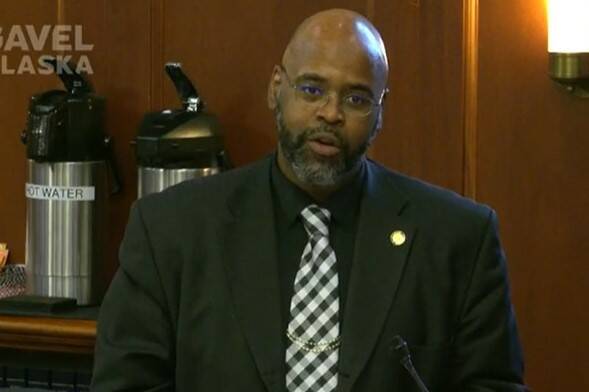A bill that would prohibit schools and employers from prohibiting natural hairstyles passed the Alaska State Senate Wednesday, with broad bipartisan support.
The bill is co-sponsored by Sens. David Wilson, R-Wasilla, and Elvi Gray-Jackson, D-Anchorage, currently the only Black lawmakers in the Alaska State Legislature.
“Senate Bill 174 addresses an issue that many people endure in silence,” Wilson said on the floor of the Senate Wednesday. “No employee or student should be prohibited from participating in work or attending school because they’re wearing their natural hair, nor should they feel like they’re in a petting zoo.”
A 2021 study from the Brookings Institute found Black students are disciplined at a rate four times higher than any other racial or ethnic group and 70% of all suspension disciplines are discretionary.
“Specifically, Black students are more likely to be suspended for discretionary reasons such as dress code or long hair violations, neither of which have been found to be predictive of student misconduct,” the study said.
Such studies, Wilson said, “confirmed what many folks of color have suspected and grappled with even today.”
The bill passed with Senate without debate Tuesday, and received only one nay vote from Sen. Lora Reinbold, R-Eagle River. Wilson noted the bill does not restrict health and safety regulations such as hairnets for food workers.
There’s a concurrent bill working its way through the House of Representatives, and in a hearing with the House Education Committee, earlier this month several testifiers spoke about discrimination people of color can face for wearing their hair naturally.
[House again cancels floor session amid masking debate]
During the meeting, Rep. Mike Prax, R-North Pole, asked how people are to know what is and isn’t an acceptable hairstyle.
“I would ask anyone that is testifying if they could please send us pictures of what they consider, I don’t know acceptable, natural,” Prax said at the March 14, meeting. “Is there some boundary (for) those of us that feel threatened honestly, by certain people and certain appearances of people? When is it okay for us to feel threatened and when should we react by accepting?”
In an interview with the Empire, Alaska Coalition of BIPOC (Black, Indigenous and people of color) Educators Vice President Rozlyn Grady-Wyshe said Prax’s questions illustrate the need for better understanding. Grady-Wyshe said she sent Prax photos of different hairstyles, but said the burden shouldn’t be on people of color to defend their natural hair.
“Why should the burden be on me to prove to you to be that we belong in a society we’ve been a part of (for a long time)?” Grady-Wyshe said. “Why do we have to continue to do the research for America that Americans can do themselves?”
Grady-Wyshe said she faced discrimination for her hair as a student and now as an educator with her own children sees students experiencing similar self-consciousness about their natural hair.
“When it comes to this bill, workers in the district will be more comfortable to be themselves, students will be more ready to be themselves,” Grady-Wyshe said.
The Juneau School District Board of Education dress code policy states students have the right to make individual choices from a wide range of clothing and grooming styles that do not present a health or safety hazard or a distraction that would interfere with the educational process.
According to the Juneau-Douglas High School: Yadaa.at Kalé student handbook, “it is the policy of (JDHS) to ensure an educational environment free of discrimination or harassment on the basis of race, color, religion, sex, sexual orientation, gender identity or expression, age, disability, citizenship, national origin, genetic information, or any other characteristic.”
The U.S. House of Representatives passed a similar bill earlier this month known as the Crown Act with less bipartisan support. According to the Associated Press, all but 14 House Republicans voted against the bill. The vote in the U.S. House was March 18, the same day Rep. Don Young, R-Alaska, died.
In addition to the federal legislation, state Crown Act laws have been passed in 14 states as part of a campaign by consumer goods company Dove, in a coalition with the National Urban League, Color Of Change and the Western Center on Law & Poverty.
• Contact reporter Peter Segall at psegall@juneauempire.com. Follow him on Twitter at @SegallJnuEmpire.

